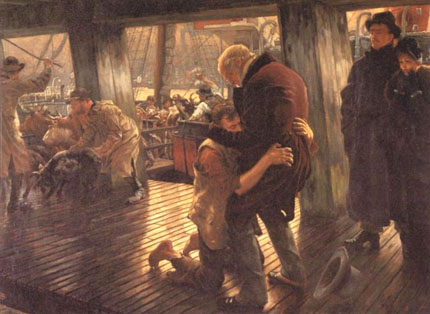The Forgiving Father

In tomorrow's Gospel reading Jesus tells one of his best known parables, The Prodigal Son. The Rev. Ken Kesselus has preached on this passage saying,
The fine point of interpretation obviously hinges on whether the younger son was restored to his former hereditary position after he wasted his share and then returned, or whether he received no further inheritance. Contrary to the legal view, many assume that the younger son was completely taken back into full and total relationship with his father when he returned. The older son would not have been so upset simply about his brother being given a party. He must have understood that the younger son was back in the inheritance picture, and would one day receive a half of what the older brother had come to expect as the full remaining inheritance.The full text of his sermon is online here: Fourth Sunday in Lent, Year C
In fact, the story would carry no real weight if the legal view is correct -- if Jesus' point was simply that the younger son was given a party by his father and allowed to become a worker on the farm. It is too conventional, too ordinary, too human to imagine a father welcoming a prodigal's return, throwing a party for him, and yet protecting the older son's investment by not letting the prodigal again become an heir.Of course, such a view affirms our natural idea of fairness. But that's just the point. That is where the argument breaks down. It is simply too legalistic, places too much emphasis on the unfairness of the prodigal getting an additional portion of inheritance, and relies too much on the concept of rewards and punishments.
Those who choose to call this the "Parable of the Forgiving Father" view the prodigal, younger son as forgiven and accepted by the father, and also brought back fully into the family and eventually given an additional share of the inheritance-unfair as that may seem....
When Jesus had the father say to the older son, "Everything I have is yours," he described the treasure chest of God's mercy and love that is inexhaustible. God makes each of us equal heirs of God's kingdom. God gives each of us an equal share, whether we come to the kingdom early or late. Jesus illustrated the same thing by having the father say to the younger son, after his return from a season of sin, "you remain my son, and you share equally with you older brother."
Labels: The Prodigal Son







0 Comments:
Post a Comment
<< Home